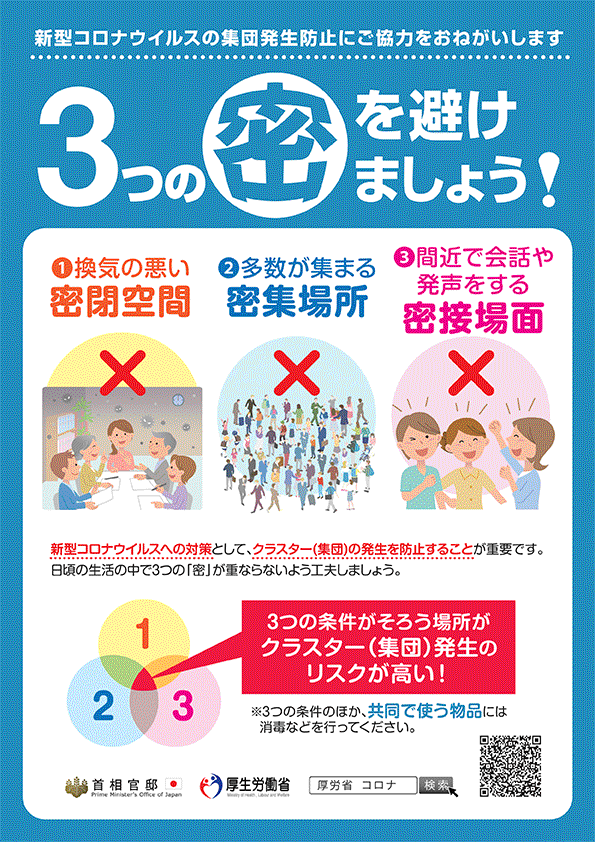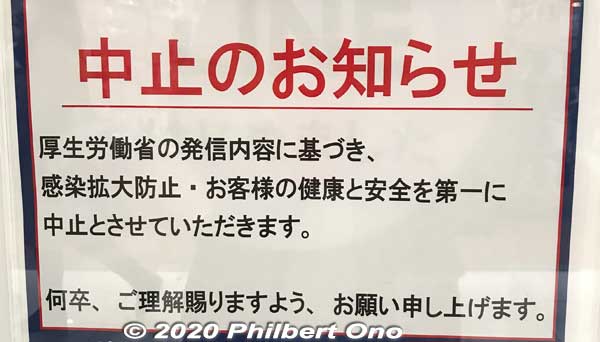For people studying Japanese or English, here’s a Japanese vocabulary list and basic phrases we often hear in Japan for COVID-19. This list might help healthcare workers and patients in Japan.
Interesting that the words “cluster,” “lockdown,” and “social distancing” are entering the Japanese language as English loanwords. “Lockdown” is often mentioned in Japan, but there no such thing as a lockdown in Japan due to to legal constraints. It’s looser in Japan with no fines for outings.

Compiled by Philbert Ono, updated: April 18, 2020
novel coronavirus – shingata-korona-uirusu 新型コロナウイルス
epidemic – ryūkō 流行
pandemic – pandemic パンデミック
infection/infect (virus) – kansen 感染
outbreak (of virus) – shudan kansen 集団感染
spreading of infection – kansen kakudai 感染拡大
spike of infections – kansen kyūzō 感染急増
major surge of infections – kansen bakuhatsu 感染爆発 or overshoot オーバーシュート
cluster – kansensha no shūdan (感染者の集団) or クラスター
contact tracing (to infection origin) – kansen keiro tsuiseki 感染経路追跡
untraceable infection origin – kansen keiro fumei 感染経路不明
person who had close contact with infected person – nōkō sesshoku-sha 濃厚接触者
infectious disease – kansen-shō 感染症 or densen-byō 伝染病
flatten the curve – ryūkō no peak wo sageru 流行のピークを下げる
infected person(s) – kansen-sha 感染者
number of infected persons – kansensha-sū 感染者数
number of deaths (followed by number of people) – ~nin shibō ~人 死亡
deaths – shisha 死者
confirmed cases (followed by number of people) – ~nin kansen kakunin ~人 感染確認
case fatality rate – chishiritsu 致死率
recovered from illness – kaifuku 快復
released from hospital – tai-in 退院
infection by respiratory droplets (cough/sneeze) – himatsu kansen 飛沫感染
infection by close contact with another person – sesshoku kansen 接触感染
sampling (swab for virus testing) – kentai saishu 検体採取
exam/test (for virus or physical condition) – kensa 検査
PCR test – PCR kensa, PCR検査
test kit – kensa kit 検査キット or kōtai kensa shiyaku kit 抗体検査試薬キット (antibody testing reagent kit)
tested positive – yōsei 陽性
tested negative – insei 陰性
symptoms – shōjō 症状
asymptomatic – mushōjō 無症状 or mushōjō byōgen-tai hoji-sha 無症状病原体保持者
no symptoms – mushōjō 無症状
mild symptoms – karui shōjō 軽い症状 or keishō 軽症
mild case/condition (medical) – keishō 軽症
serious case/condition (medical) – jūshō 重症
patient with mild symptoms – keishō-sha 軽症者
patient in serious condition – jūshō kanja 重症患者
show symptoms (of disease) – hatsubyō 発病
fever – netsu 熱
come down with a fever – hatsu-netsu 発熱
cough – seki せき
fatigue – kentaikan 倦怠感
breathing difficulty – iki-gurushii 息苦しい or kokyū konan 呼吸困難
sick (from disease) – byōki 病気
medical condition worsening – byōjō ga akka 病状が悪化
state of emergency – kinkyū jitai 緊急事態
declaration of state of emergency – kinkyū jitai sengen 緊急事態宣言
state of emergency measures – kinkyū jitai sochi 緊急事態措置
lockdown – toshi fūsa 都市封鎖 or ロックダウン or gaishutsu kinshi 外出禁止
stay at home – gaishutsu jishuku 外出自粛
stay-at-home request – gaishutsu jishuku yosei 外出自粛要請
non-essential outings – fuyō fukyū no gaishutsu 不要不急の外出
social distancing – ソーシャル・ディスタンシング shakai kyori senryaku 社会距離戦略
isolation – kakuri 隔離
self-isolation at home – jitaku taiki 自宅待機
self-isolation – jiko kakuri 自己隔離 or jishu kakuri 自主隔離
quarantine – ken-eki 検疫
isolation/quarantine measures (after arrival from an infected country) – kakuri sochi 隔離措置
telework – テレワーク or zaitaku kinmu 在宅勤務 (work at home)
public health center – hokenjo 保健所
hospital – byōin 病院
medical institution for infectious diseases – kansensho shitei iryo kikan 感染症指定医療機関
hospitalize – nyūin 入院
patient (medical) – kanja 患者
healthcare worker – iryō jūji-sha 医療従事者
doctor – ishi 医師
nurse – kangoshi 看護師
hospital beds – byōshō 病床
overwhelmed/collapsed health care system – iryō hōkai 医療崩壊
mask (face protection) – mask マスク
N45 mask – kōseinō mask 高性能マスク or N95マスク
shortage (of a product) – shina-usu 品薄
hazmat suit – bōgo-fuku 防護服
personal protective equipment (PPE) – kojin-yō bōgo-gu 個人用防護具
hand sanitizer – te-yubi shōdoku-zai 手指消毒剤
disinfectant wipes – jokin wet tissues 除菌ウェットティッシュ
disinfect – shōdoku 消毒
medical treatment – chiryō 治療
ICU (Intensive Care Unit) – shūchū chiryō-shitsu 集中治療室
ventilator – jinkō kokyūki 人工呼吸器
medicine – kusuri 薬
vaccine – wakuchin ワクチン
recovery (from illness) – kaifuku 快復
eradication (the virus spread) – shūsoku 終息
Ministry of Health, Labour and Welfare – Kōsei Rōdōshō 厚生労働省
panic buying – kai-shime 買い占め
cancellation (of event) – chūshi 中止
postponement (of event) – enki 延期
business closed for now – kyūgyō 休業
pray – inoru 祈る
*”Overshoot” (オーバーシュート) is often being used in Japan to mean “explosive surge in infections.” No such meaning in English nor in Japanese, so it’s baffling to everyone. It seems someone just made it up and everyone picked it up. Wish they would use easier words that the public can understand. Japan has never been good at communication. Vague, confusing language. More here: https://www.japantimes.co.jp/news/2020/04/04/national/tokyo-overshoot-coronavirus/

As shown by the above notice from the Ministry of Health, in Japan, they keep emphasizing that we must avoid the following three situations in any combination (the three mitsu’s 密):
- high-density crowd – misshu (basho) 密集(場所)
- close social distance – missetsu (bamen) 密接(場面)
- sealed or enclosed space/room – mippei (kukan) 密閉(空間)
In other words, a sealed room with no air circulation full of people crowded together and talking a lot is the most hazardous situation for spreading infections.
Coronavirus/Pandemic Japanese Phrases
Compiled by Philbert Ono
Around town, the most frequent words or phrases we now see are “chūshi” (canceled) and “kyūgyō” (closed).
Temporarily closed (store or business). – rinji kyūgyō 臨時休業
Notice of closure of museum, indoor pool, etc. – Kyukan no oshirase 休館のお知らせ
Notice of closure of park, etc. – Rinji kyūjo 臨時休場
Sports facility, etc., closed – riyo chūshi 利用中止
Notice of event cancellation – Chūshi no oshirase 中止のお知らせ
No masks in stock. – Mask keppinchu マスク欠品中
No more stocking (of product) for today. – Honjitsu no nyūka-bun wa shūryō shimashita. 本日の入荷分は終了しました
Restocking date of product unknown – Nyūka mitei 入荷未定
Purchase limited to one per family only (toilet paper, etc.) – Hito kazoku 1 ten, 1家族1点
Purchase limited to one per person only (toilet paper, etc.) – O-hitori-sama itten お一人様1点
Please wear a face mask (when visiting a hospital, etc.). – Mask no chakuyō wo onegai shimasu. マスの着用をお願いします。
We are taking your temperature (before entering a hospital, etc.) – Taion sokutei wo jisshi shiteimasu 体温測定を実施しています。
